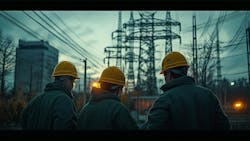DNV Survey: Energy Sector Faces Short-Term Challenges While Maintaining Long-Term Confidence
The global energy industry is experiencing short-term uncertainty due to geopolitical and economic factors, but maintains a generally positive outlook for the long term, according to DNV’s 15th annual Energy Industry Insights survey.
The survey, which reflects the perspectives of more than 1,100 senior energy professionals, highlights that political risk is currently viewed as the primary obstacle to industry growth. Perceptions around the pace of the energy transition have also shifted, with 55% of respondents believing the transition is accelerating — down from 72% last year and 79% the year before.
Additionally, 51% of those surveyed expressed concerns that the energy transition could lead to adverse impacts on certain communities. These may include economic displacement, unequal access to benefits, and high transition costs. Respondents emphasized the importance of equitable access to clean energy technologies and innovative financing models to mitigate these challenges and support a fair transition.
Short-term financial concerns were also noted, particularly among clean energy developers. Many reported worries about meeting revenue and profit targets. A significant number of respondents indicated delays in investment decisions or a shift toward smaller-scale projects due to market volatility.
Despite these near-term challenges, long-term confidence is supported by broader trends such as increased electrification, decarbonization efforts, and technological innovation.
Ditlev Engel, CEO of Energy Systems at DNV said, “The energy transition remains complex and subject to external pressures, including geopolitical instability and economic uncertainty. While these factors pose risks, the sector continues to work toward a low-carbon, resilient, and sustainable energy future.”
The report notes a decline in confidence within the renewables sector. Just 50% of respondents expect to meet revenue goals, and 43% are optimistic about profitability — figures that have decreased substantially compared to three years ago.
Only 39% of respondents in the renewables sector expect increased investment in the coming year. This hesitation is attributed to broader macroeconomic trends and regulatory uncertainty.
Lucy Craig, Director of Growth, Innovation and Digitalization at DNV Energy Systems commented, “While short-term outlooks are cautious, there is broad agreement that structural drivers such as climate urgency and innovation will continue to shape industry progress.”
Approximately 70% of energy professionals remain confident in the industry's long-term growth trajectory. Many cite the continued digitalization of the energy system as essential to enabling a more interconnected and efficient energy landscape. About 64% believe that a whole systems approach is not achievable without fully digital infrastructure, and 59% plan to increase investment in digital technologies, including artificial intelligence.
Infrastructure limitations also remain a concern, particularly aging power grids. More than 75% of power sector respondents identify outdated grid infrastructure as a key barrier to the expansion of renewable energy, and 96% support urgent investment in grid modernization.
Craig added, “Power grids are central to the success of electrification and renewable energy deployment. Investment in grid infrastructure and digital technologies will be critical to advancing a more flexible and resilient energy system.”
